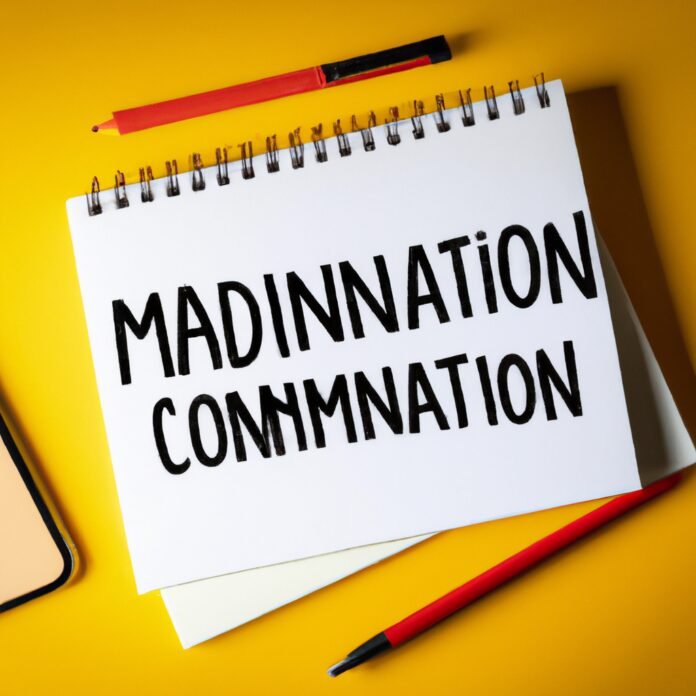We all strive to feel connected and valued in our relationships. Whether that’s with a partner, family member, colleague, friend, or a stranger, the ability to communicate well and from a place of compassion is key in deepening our interconnectivity with the world around us. By leveraging the power of mindfulness, we can use our words to create meaningful connections that strengthen and nurture our existing relationships. This article will explore how mindful communication can enhance our relationships and support meaningful dialogue.
1. The Power of Mindful Communication
Communication is key to any successful relationship. Using mindful communication can help us build stronger, healthier relationships with those around us. Mindful communication involves actively listening and speaking with awareness and care for the other person.
Accepting Your Feelings and Emotions: Taking the time to recognize and accept your own emotions is the first step to mindful communication. It’s important to recognize your own feelings before speaking so that you can explain your thoughts and feelings without anger or judgement.
Making Space to Listen: Listening without judgement is paramount to mindful communication. Making space for the other person to express their thoughts and feelings without fear of judgement or criticism can help foster understanding and empathy.
Talking Openly and Honestly: Mindful communication requires that we be open and honest with ourselves and the other person. This means being willing to talk about difficult topics, such as disagreements, without attacking or blaming. When we’re able to speak our truth without fear of judgment, it allows us to create a dialogue that builds trust and understanding.
Using Inquiries and Questions: Mindful communication means asking questions and using inquiries to lead to deeper understanding. Avoid making assumptions and replace them with open-ended questions. This can help bring clarity to the conversation and avoid miscommunication.
Giving Yourself Time: Mindful communication takes time and it’s important to give yourself the time needed to find clarity and understanding. Taking a few moments to pause and reflect before responding can help create a space for mindful communication.

2. Exploring the Benefits of Intentional Conversation
Conversation, whether intentional or not, is a necessary part of life that can bring many benefits. , specifically, can have a number of positive effects in both personal and professional settings.
How Intentional Conversation Can Improve Relationships:
- It allows for meaningful connections to be formed, bringing people closer together and possibly even strengthening bonds between them.
- Through intentional conversations, both parties in the conversation have the opportunity to be fully heard, and thus be better understood.
- The exchange also offers both sides the chance to share ideas and perspectives, leading to more meaningful interactions.
How Intentional Conversation Can Increase Productivity:
- By having meaningful conversations, tasks that would normally be time consuming and mundane can be accomplished much quicker.
- It can also be used as an effective tool in brainstorming, as it allows people to bounce ideas off each other and come up with solutions much more quickly than if they were working alone.
- Intentional conversations also provide an avenue for constructive criticism, which can help to improve performance and increase productivity.
How Intentional Conversation Can Aid Professional Development:
- It can provide valuable career advice, as people who are experienced in their field are usually open to giving others guidance and help.
- It is also effective in networking, as it allows people to make meaningful connections that could potentially lead to career advancement.
- It provides invaluable lessons in communication, as both parties in the conversation can learn how to better articulate ideas and points of view.
In conclusion, engaging in intentional conversation can bring a host of benefits, both in personal and professional life. From fostering relationships to exchanging meaningful ideas, intentional conversations provide a platform for growth and development that can be beneficial in many ways.
3. Cultivating Connection Through Listening and Responding
Actively Engage
Active listening is one of the best tools for cultivating connection with others. Being present, making eye contact, and maintaining an open and welcoming body posture are all key elements to actively engaging with someone and conveying a deep sense of openness to what someone is saying.
When responding, it’s important to make sure to express understanding and validate the other person. This can be done by affirming their feelings and ideas, and having genuine curiosity about what they are saying. Avoid judgment or criticism, instead, use your response as an opportunity to demonstrate respect and understanding.
Stay Focused and Responsive
When actively engaging with another person, resist the temptation to be distracted. Prolonged distractions, such as focusing on your phone or wandering off topic, indicate to the other person that their thoughts are not important or valued.
Stay compromising and offer ideas to try to work through disagreements rather than shut down or argue. This is a sure-fire way to maintain a strong connection with others.
Find Balance
Balancing time spent talking with time spent listening is key. Although it is important to share your own ideas and stories, make sure to also keep your listener in mind. Taking a team approach to dialogue and working together to problem solve allows for two individuals to gain a deeper understanding of each other.
Finally, speak from the heart. To truly connect with others, be willing to share more vulnerable thoughts and emotions. Let go of trying to be perfect and practice courage in the face of relational risk.
Be A Team Player
Speaking of relational risk, it’s important to remember that when in a relationship, you are also part of a team. Both individuals count, and a good relationship needs both you and the other person for success.
By following the tips outlined above, you can cultivate connection by actively engaging with your partner, staying focused and responsive, finding balance, and remembering that you are part of a team.
4. Harnessing the Potential of Relationships Through Mindful Communication
What if we could improve our relationships by simply being mindful of how we communicate? It turns out that by becoming aware of how we communicate, our conversations become more meaningful and, in turn, also improve our relationships.
Make Time for Quality Communication: Relationships are built on the foundation of quality communication, as our conversations and interactions are what make or break trust between us. Make use of opportunities to really listen and talk to your family and friends. Don’t just talk but give each other time to think and express yourselves.
Be Present: Being present and in the moment when communicating is key. Acknowledge your partner’s presence and be mindful of what you’re both saying – take the time to be both understanding of and considerate of each other’s feelings. You become more in tune with each other when you’re mindful of the moment.
Be Honest and Open: Having an honest and open communication with the important people in your life helps you create a strong bond and deep connection with them. So, be honest and open and share your genuine thoughts and feelings. Creating this safe space of dialogue between you and your loved ones allows yoi to become emotionally available to each other.
Show Empathy: Empathy and understanding are essential for establishing meaningful relationships. Take time to understand your partner’s view and perspective, and accept them for who they are instead of trying to force them to fit your own opinion or idea. Appreciate and respect their thoughts, feelings, and ideas.
- Make time for quality communication
- Be present
- Be honest and open
- Show empathy
Mindful communication is essential for creating meaningful relationships with the people around us. By making the effort to be both aware and considerate when communicating, we can make sure we’re not only taking care of our own needs but also that of the people we care about.
By embracing a mindful approach to communication, we can improve our relationships and create mutually beneficial connections. Ready to start reaping the rewards of mindfulness? It’s time to enter the world of mindful communication!

